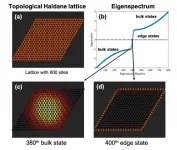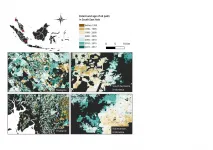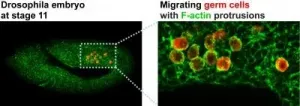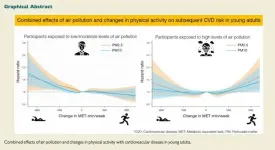How to talk to people about climate change
2021-03-30
(Press-News.org) As our planet warms, seas rise and catastrophic weather events become more frequent, action on climate change has never been more important. But how do you convince people who still don't believe that humans contribute to the warming climate?
New UBC research may offer some insight, examining biases towards climate information and offering tools to overcome these and communicate climate change more effectively.
Researchers examined 44 studies conducted over the past five years on the attentional and perceptual biases of climate change - the tendency to pay special attention to or perceive particular aspects of climate change. They identified a number of differences between people of different political orientations, finding that those who were more liberal tended to pay attention to the rising part of a global temperature graph. When the temperature increase was emphasized in red, these people were more likely to take actions on climate change, including signing petitions and donating money. Not so for conservatives, where this effect was absent.
The review explains cognitive reasons for a lack of actions on climate change, says Prof. Jiaying Zhao (she/her/hers), a Language Sciences member and senior author, along with her student Yu Luo (he/him/his). "Climate change is a problem of collective behaviours so to address it, you have to address behaviours first."
These biases include that liberals who were concerned about the climate were more accurate at identifying climate-related words (e.g., carbon) than neutral words (e.g., coffee) in a rapid visual presentation, while conservatives who weren't concerned were no better at seeing climate-related words over neutral words, suggesting that people with different political orientations show different attentional priorities to climate change information.
This is something with which Prof. Zhao, an associate professor in the department of psychology and the Institute for Resources, Environment and Sustainability, has personal experience. "Anything to do with climate change in the news catches my attention. Anything about the climate in the headlines - carbon, flooding, hurricanes - it draws my attention quickly." Everyone has biases, Prof. Zhao says, and she is working to correct her own, "but no one is immune." Indeed, the review noted people with higher numeracy or literacy skills are better at selectively analyzing information to confirm their prior beliefs.
Perceptual biases were highlighted as well: the review concluded that misperceptions of norms within a group can be a barrier to bipartisan climate policy making in the U.S., with one study showing that people often hold distorted perceptions of the degree of opposition from those outside their group, resulting in a false sense of polarization. Another study found that the perception of greenhouse gas emissions was often incorrect, with people not understanding how global warming works, or the emissions associated with things like a hamburger or a flight.
Prof. Zhao stresses the urgency of addressing these biases to spur actions on climate change. "It is an increasingly urgent global challenge and we need to do something about it fast." The authors suggest several communication tools to do so, including that communication of climate change should align with a target group's ideologies and values: for conservatives, this could include framing pro-environmental actions as benefiting the economy, building a more moral and caring community or benefiting future generations. Negative framing has been shown to be more effective, Prof. Zhao says, so pointing out the negative consequences to one's family of climate change could be an effective communication tool. "Regardless of your political orientation, if it's going to harm your children, every parent will want to take action."
Other tools include providing accurate information on social norms for both in-groups and out-groups, for instance, the actual percentage of conservatives who do not believe in anthropogenic climate change; and providing simple and understandable visualizations of the greenhouse gas emissions of individual actions and items.
Whichever communication tool is used, the authors advise targeting specific cognitive processes associated with the audience group to effectively persuade people. And further work is needed on how to translate information to personal action, they say. But the time to act is now, says Prof. Zhao, with the paper providing policy makers clues to, and solutions for, inaction. "I see an urgent need to call for collective climate actions. We're not doing enough to address climate change and this paper explains some of the reasons."
INFORMATION:
ELSE PRESS RELEASES FROM THIS DATE:
2021-03-30
UNIVERSITY PARK, Pa. -- A reproducibility crisis is ongoing in scientific research, where many studies may be difficult or impossible to replicate and thereby validate, especially when the study involves a very large sample size. For example, to evaluate the validity of a high-throughput genetic study's findings scientists must be able to replicate the study and achieve the same results. Now researchers at Penn State and the University of Minnesota have developed a statistical tool that can accurately estimate the replicability of a study, thus eliminating the need to duplicate the work and effectively ...
2021-03-30
In a joint effort, researchers from the Humboldt-Universität (Berlin), the Max Born Institute (Berlin) and the University of Central Florida (USA), have revealed the necessary conditions for the robust transport of entangled states of two-photon light in photonic topological insulators, paving the way the towards noise-resistant transport of quantum information. The results have appeared in Nature Communications.
Originally discovered in condensed matter systems, topological insulators are two-dimensional materials that support scattering-free (uni-directional) transport along their edges, even in the presence of defects and disorder. In ...
2021-03-30
IIASA researchers have used Sentinel 1 satellite imagery from the European Space Agency to produce a map of the extent and year of detection of oil palm plantations in Indonesia, Malaysia, and Thailand that will help policymakers and other stakeholders understand trends in oil palm expansion while also providing an accurate map for landscape-level planning.
The world's appetite for palm oil seems to know no bounds. We use it in everything from beauty products and food, to industrial processes and biofuels to fulfill our energy needs. This ever growing demand has caused oil palm production to more than double in the last two decades, a development which has in turn deeply impacted natural forest ecosystems and biodiversity, while also significantly ...
2021-03-30
One in four Germans suffers from metabolic syndrome. Several of four diseases of affluence occur at the same time in this 'deadly quartet': obesity, high blood pressure, lipid metabolism disorder and diabetes mellitus. Each of these is a risk factor for severe cardiovascular conditions, such as heart attack and stroke. Treatment aims to help patients lose weight and normalise their lipid and carbohydrate metabolism and blood pressure. In addition to exercise, doctors prescribe a low-calorie and healthy diet. Medication is often also required. However, it is not fully clear ...
2021-03-30
Researchers at KU Leuven (Belgium) have succeeded for the first time in measuring brain waves directly via a cochlear implant. These brainwaves indicate in an objective way how good or bad a person's hearing is. The research results are important for the further development of smart hearing aids.
A cochlear implant enables people with severe hearing loss to hear again. An audiologist adjusts the device based on the user's input, but this is not always easy. Think of children who are born deaf or elderly people with dementia. They have more difficulty assessing and communicating ...
2021-03-30
Artificial Intelligence is now capable of generating novel, functionally active proteins, thanks to recently published work by researchers from Chalmers University of Technology, Sweden.
"What we are now able to demonstrate offers fantastic potential for a number of future applications, such as faster and more cost-efficient development of protein-based drugs," says Aleksej Zelezniak, Associate Professor at the Department of Biology and Biological Engineering at Chalmers.
Proteins are large, complex molecules that play a crucial role in all living cells, building, modifying, and breaking down other molecules naturally inside our cells. They are also widely used in industrial processes and products, and in our daily lives.
Protein-based drugs are very common - the diabetes drug ...
2021-03-30
Working with fruit flies, scientists at Johns Hopkins Medicine say they have identified a new molecular pathway that helps steer moving cells in specific directions. The set of interconnected proteins and enzymes in the pathway act as steering and rudder components that drive cells toward an "intended" rather than random destination, they say.
In a report on the work, published March 2 in Cell Reports, these same molecular pathways, say the scientists, may drive cancer cells to metastasize or travel to distant areas of the body and may also be important for understanding how cells assemble and migrate in an embryo to form organs and other structures.
The team of scientists was led by Deborah Andrew, Ph.D., professor of cell biology and associate director for faculty development for ...
2021-03-30
Physical activity is important in preventing heart and blood vessel disease in young people so long as they don't undertake very strenuous activity on days when air pollution levels are high, according to a nationwide study of nearly 1.5 million people published today (Tuesday) in the European Heart Journal [1].
Until now, little has been known about the trade-offs between the health benefits of physical activity taking place outdoors and the potentially harmful effects of air pollution. Previous research by the authors of the current study had investigated the question in middle-aged people at a single point in time, but this is the first time that it has been investigated in people aged between 20-39 years over a period of several years. In addition, the researchers wanted to ...
2021-03-30
Scientists have identified three genes associated with an increased risk of developing cervical cancer.
The study, led by scientists from Imperial College London and published in the journal The Lancet Oncology, studied data from over 150,000 European women.
The research is one of the first studies to pinpoint genetic variants associated with an increased risk of cervical precancer and cancer.
The study team say the findings open avenues for identifying women at higher risk and monitoring their health more closely - particularly if genetic information is ...
2021-03-30
Markers of the pandemic's impact - testing rates, positivity ratio (cases among total tests), case rates by overall population and deaths - are clustered in neighborhoods, with low-income and predominantly minority communities experiencing worse outcomes than wealthier and predominantly white neighborhoods. The findings, part of the first research to look at comprehensive neighborhood-level data from March through September 2020 from three large U.S. cities - Chicago, New York and Philadelphia - were published today in Annals of Internal Medicine by researchers from Drexel University's Dornsife School of Public Health.
The ...
LAST 30 PRESS RELEASES:
[Press-News.org] How to talk to people about climate change




